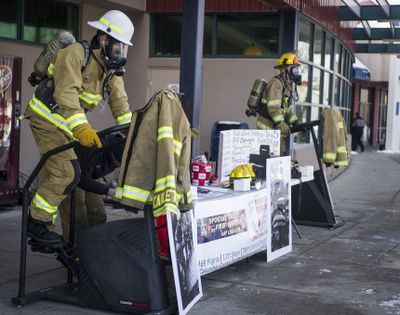Spokane Valley firefighters train in gear, step for charity

The weather leaned toward frigid Saturday morning, but temperatures in the teens didn’t stop members of the Spokane Valley Fire Department from stepping up to raise money for the Leukemia and Lymphoma Society.
The 15 firefighters that participated in Saturday’s outdoor stair-climbing fundraiser are members of the department’s team that competes in the Scott Firefighter Stairclimb in Seattle every March. Firefighters took turns climbing for 30 minutes each on two stair-climbing machines in front of the Rosauers at Sprague Avenue and University Road, wearing full firefighting gear and a face mask.
The heavy gear may have been a blessing in the cold temperatures, but their face masks were fogged up and frozen over inside by the time firefighters were done. Several took more than one shift during the five-hour event.
Valley Fire has sent a stair-climbing team to Seattle for 20 years, but this is the second year the department has done a fundraiser in advance. “We kind of got the idea from other departments around the nation,” team leader Tom Carleton said.
There was a steady flow of shoppers Saturday as people prepared for Super Bowl parties. Many dropped donations into the box. “People are really generous,” Carleton said. “It’s a great cause.”
Last year’s fundraiser, including a raffle and silent auction, raised $10,000. “Our goal this year is $20,000,” Carleton said. “We want to double it.” This year’s raffle and auction is set for Feb. 15.
Leukemia and lymphoma are something that hits close to home, Carleton said.
“We have guys on the job and their family members have it at this moment,” he said. Firefighters will carry pictures of leukemia or lymphoma patients with them during the Seattle stair climb.
The Seattle event is a race up 1,311 steps attended by firefighter teams from all over the country. Members of the Valley Fire team use the downtown Unico Building, formerly the Bank of America building, to train.
“They let us train there year-round,” Carleton said. “We go before work or after work.”
Team members start out practicing the climb in T-shirts and shorts and work their way up to doing it in full gear with a breathing mask.
“The competitive guys spend three or four months training for it,” he said.